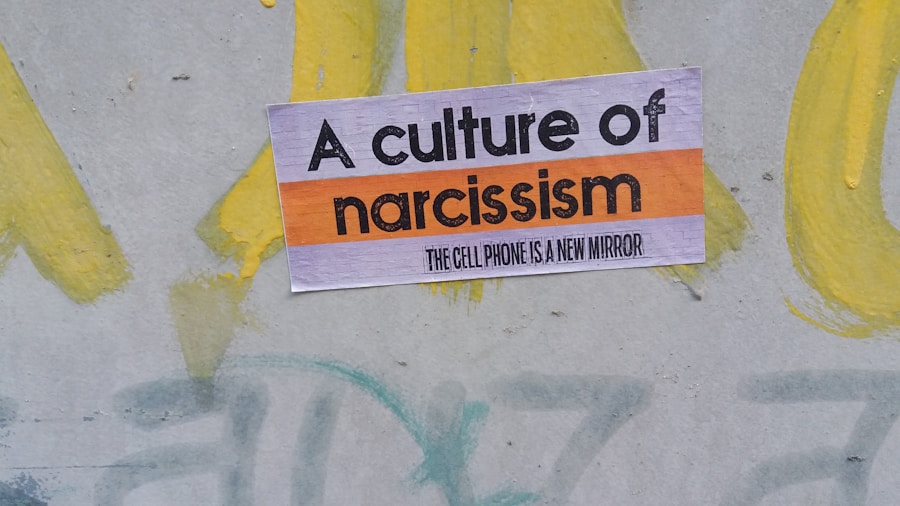ESCAPING THE NARCISSIST
Are you trapped in a toxic relationship? It's time to reclaim your life and find healing. ESCAPING THE NARCISSIST: HOW TO HEAL AND RECOVER FROM NARCISSISTIC ABUSE IN RELATIONSHIPS is your guide to breaking free and starting your journey towards recovery.
Don't let the pain control you any longer. Take the first step today and discover the strategies to overcome emotional abuse and rebuild your life. You deserve happiness and peace.
Start Your Healing Journey TodaySelfless narcissism is a concept that may seem contradictory at first glance. How can someone be both selfless and narcissistic? However, upon closer examination, it becomes clear that this paradox exists and is worth exploring. Selfless narcissism refers to individuals who display narcissistic traits and behaviors, yet also engage in acts of selflessness and altruism. Understanding this paradox is important because it sheds light on the complexity of human nature and the potential for growth and change.
The Narcissistic Personality: Traits and Characteristics
Narcissistic personality disorder (NPD) is a psychological condition characterized by an inflated sense of self-importance, a constant need for admiration, and a lack of empathy for others. Individuals with NPD often exhibit grandiose behaviors, have a sense of entitlement, and seek constant validation from others. They may also have difficulty maintaining healthy relationships due to their self-centeredness and inability to empathize with others.
Narcissists are often driven by a deep-seated insecurity and fear of rejection. They use their grandiose self-image as a defense mechanism to protect themselves from feelings of inadequacy. This constant need for validation and admiration can lead them to engage in manipulative behaviors and exploit others for their own gain.
Selflessness and Altruism: Definitions and Concepts
Selflessness refers to the act of putting others’ needs before one’s own. It involves acts of kindness, compassion, and empathy towards others without expecting anything in return. Altruism, on the other hand, is a broader concept that encompasses selflessness but also includes the motivation to benefit others without any personal gain.
There are different types of altruism, including kin altruism (helping close relatives), reciprocal altruism (helping others with the expectation of receiving help in return), and pure altruism (helping others without any expectation of personal gain). Selflessness can be seen as a form of pure altruism, where individuals genuinely care about the well-being of others and are motivated by a desire to make a positive impact on the world.
The Paradox of the Selfless Narcissist: An Overview
The paradox of the selfless narcissist arises when individuals who exhibit narcissistic traits also engage in acts of selflessness and altruism. On the surface, these behaviors may seem contradictory, as narcissists are typically known for their self-centeredness and lack of empathy. However, upon closer examination, it becomes clear that selfless narcissists may engage in acts of kindness and generosity for various reasons.
Selfless narcissists may engage in acts of selflessness as a way to gain validation and admiration from others. They may use their acts of kindness as a means to boost their own ego and maintain their grandiose self-image. By presenting themselves as generous and caring individuals, they can manipulate others into seeing them in a positive light and fulfilling their need for admiration.
Understanding the Contradiction: Psychological Explanations
The paradox of the selfless narcissist can be understood through various psychological explanations. One explanation is cognitive dissonance, which refers to the discomfort that arises when individuals hold conflicting beliefs or engage in contradictory behaviors. Selfless narcissists may experience cognitive dissonance when their self-centeredness clashes with their acts of kindness. To reduce this discomfort, they may engage in more selfless behaviors to align their actions with their desired self-image.
Childhood experiences also play a role in shaping the paradox of the selfless narcissist. Individuals who grow up in environments where they receive inconsistent or conditional love may develop narcissistic traits as a defense mechanism. They learn that they need to constantly seek validation and attention from others to feel worthy and loved. However, they may also learn the value of selflessness and altruism from positive role models or experiences, leading to the development of selfless behaviors alongside their narcissistic tendencies.
Personality traits also contribute to the paradox. Some individuals may have a combination of narcissistic and empathetic traits, leading to a complex interplay between self-centeredness and selflessness. These individuals may have a strong desire for validation and admiration but also possess a genuine concern for others’ well-being. This combination of traits can result in the paradox of the selfless narcissist.
The Role of Empathy in Selfless Narcissism
Empathy, the ability to understand and share the feelings of others, plays a crucial role in understanding selfless narcissism. Narcissists are often characterized by a lack of empathy, as they struggle to understand or connect with others on an emotional level. However, some narcissists may possess a form of cognitive empathy, which allows them to understand others’ emotions without necessarily feeling them themselves.
This cognitive empathy can enable selfless narcissists to engage in acts of kindness and generosity. They may be able to recognize when others are in need and understand how their actions can benefit them. However, their lack of emotional empathy may prevent them from truly connecting with others on a deeper level or experiencing genuine compassion.
The Influence of Social Norms and Expectations
Societal expectations and norms play a significant role in perpetuating the paradox of the selfless narcissist. In many cultures, selflessness is highly valued and seen as a desirable trait. Individuals are praised for their acts of kindness and generosity, which can reinforce narcissistic tendencies if they are seeking validation and admiration.
Additionally, social media has played a significant role in perpetuating the paradox. Platforms like Instagram and Facebook provide opportunities for individuals to showcase their acts of kindness and generosity to a wide audience. This can create a cycle where selfless narcissists engage in acts of kindness for the purpose of gaining validation and admiration from others, which in turn fuels their narcissistic tendencies.
The Link between Selflessness and Narcissistic Supply
Narcissistic supply refers to the attention, admiration, and validation that narcissists seek from others. It is a crucial component of their self-esteem and self-worth. Selfless narcissists may use their acts of kindness and generosity as a means to obtain narcissistic supply. By presenting themselves as selfless and caring individuals, they can elicit praise and admiration from others, which fulfills their need for validation.
However, the pursuit of narcissistic supply can also undermine the authenticity of their selfless acts. If their primary motivation is to gain validation rather than genuinely caring for others, their actions may be seen as manipulative and insincere. This can create a cycle where selfless narcissists engage in acts of kindness solely for the purpose of obtaining narcissistic supply, rather than out of genuine concern for others.
The Dark Side of Selfless Narcissism: Manipulation and Control
While selfless narcissism may involve acts of kindness and generosity, it can also have a dark side. Selfless narcissists may use their selflessness as a tool for manipulation and control. They may engage in acts of kindness to gain power over others or to maintain a sense of superiority. By presenting themselves as selfless and caring individuals, they can manipulate others into doing what they want or into seeing them in a positive light.
This manipulation can have a detrimental impact on relationships. Selfless narcissists may exploit others’ vulnerabilities or use guilt and manipulation to get what they want. They may also engage in gaslighting, where they manipulate others into doubting their own perceptions or reality. This can lead to toxic and abusive relationships where the selfless narcissist maintains control over others through their acts of kindness.
Recognizing and addressing manipulative behavior is crucial in overcoming the dark side of selfless narcissism. It is important for individuals to set boundaries and assert their own needs and desires in relationships. By recognizing manipulative behaviors and addressing them directly, individuals can create healthier and more balanced relationships.
Overcoming the Paradox: Strategies for Self-Awareness and Growth
Overcoming the paradox of the selfless narcissist requires self-awareness and a willingness to grow and change. Self-awareness involves recognizing one’s own narcissistic tendencies and understanding the impact they have on oneself and others. This can be achieved through introspection, therapy, or seeking feedback from trusted individuals.
Developing empathy is also crucial in overcoming the paradox. Empathy allows individuals to connect with others on an emotional level and understand their experiences and feelings. By developing empathy, selfless narcissists can move beyond their cognitive empathy and cultivate a genuine concern for others’ well-being.
Therapy can play a significant role in addressing narcissistic tendencies and promoting personal growth. Therapists can help individuals explore the underlying causes of their narcissistic traits, such as childhood experiences or unresolved trauma. They can also provide tools and strategies for developing empathy, setting boundaries, and building healthier relationships.
Embracing the Complexity of Human Nature
The paradox of the selfless narcissist highlights the complexity of human nature and the potential for growth and change. It challenges our preconceived notions of what it means to be selfless or narcissistic and reminds us that individuals are capable of exhibiting contradictory behaviors.
By understanding this paradox, we can gain insight into the motivations behind selfless narcissistic behavior and recognize the impact it has on relationships and society. It also encourages us to embrace the complexity of human nature and recognize that individuals are capable of growth and change.
Addressing the paradox of the selfless narcissist requires self-awareness, empathy, and a willingness to confront and address manipulative behaviors. By cultivating these qualities and seeking therapy when necessary, individuals can overcome their narcissistic tendencies and develop healthier and more balanced relationships. Ultimately, this can lead to personal growth and a positive impact on society as a whole.


